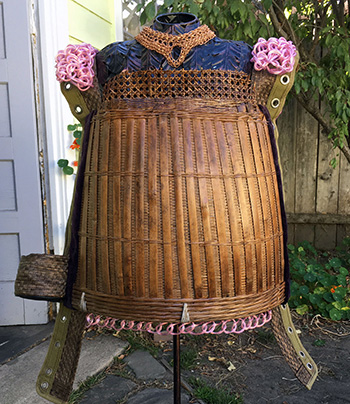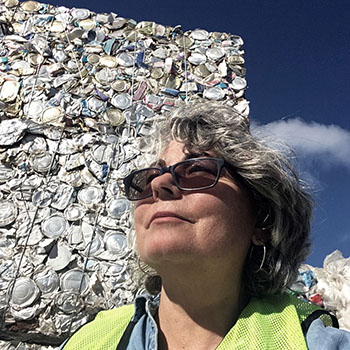Pamela Dewey has participated in many initiatives to promote sustainable practices in the Social Sciences Division, that inspired a lot of colleagues. Pamela also has a hidden "sustainable talent," that she will share in this interview, and you will be able to see at the SCRAP show this coming Friday.
Tell us a bit about yourself, your background and how you came to UCSC.
My background, before coming to UCSC, was in the archive and museum world. I also worked for several non-profits, as well as for a local photographer. I started working at UCSC several years after moving to Santa Cruz. Working in higher education was a good fit with my past experience.
What is your role in your current position and how did you begin to incorporate sustainability practices at work?
My role is executive assistant to the dean of the Social Sciences division. I started incorporating sustainability practices in the office shortly after I arrived by securing two zero waste stations for the Humanities/Social Sciences building, on the 2nd and 4th floors. We were fortunate that the Humanities building was already on the pick-up route and we were able to piggy-back on that. Before coming to the Division office, I worked at the Center for Agroecology and Sustainable Food systems, where there was a ZW station (in the Hay Barn) and sustainability is part of the ethos. Once you are used to having a ZW station it can be a bit of a shock to see how much food from events, and just day-to-day lunches, goes into the trash and from there to the landfill.
In the Social Sciences Division Office, were you the initiator of a “green movement” of sorts. Correct? Or did that began before you?
The Green Team in Social Sciences was assembled in 2017 and was modeled after the team that Humanities had launched. Our events director, Joni White, asked me to join, along with Tiffany Winslow, the SocSci facilities coordinator. I immediately said yes, as, again, I had just come from CASFS and wanted to bring some of their sustainable practices to the Division.
The creation of the Soc Sci “Green Team” with a web page and helpful tips was also a great initiative that I believe you spearheaded. How did that come about?
Once we started the Green Team and had received the office certification I wrote up our process so that we would have a visible presence on the Division website.
I understand you also started your own green newsletter with a team of students. Do you hope to continue that in the future?
I would love to continue the newsletter. It’s called Trash Talk, as an homage to the Sustainability Office program that has students help train other students and event attendees about the right way to sort their trash to divert as much as possible from going to the landfill. Right now the newsletter is on hiatus as I don’t have a student assistant in the office, but I look forward to starting it again in the future.
Getting the Green Office Certification was also your initiative? What were the benefits of the process that you can point out, as well as post-certification that you noticed?
The Green Team in SocSci initially formed with the goal of getting our Green Office Certification. We wanted to increase awareness among staff about how they were doing and where improvement could be made in generating, sorting, and reducing their trash. I think we all learned a lot from the process, especially the trash assessment, when everything was spread out on a tarp and we could see the right way to sort it. I also plan to have our office re-certified because we have a lot of new staff who weren't here the first time we went through the process. I want to see if we can advance from Sapling to Tree in our sustainability practice.
What was your motivation to start all of these sustainable initiatives and how did you find balance to make all of that happen along with your current duties?
It certainly helped when I did have a student who could do the bulk of the research on the newsletter! The commitment to sustainability in the division also comes from the dean, Katharyne Mitchell. She encouraged me to form a Social Sciences team for the Cool Campus Challenge. I had a lot of support for putting together an outreach plan to send reminders to our team and encourage the widest possible participation. She also provided funding so that we could have prizes for the top-scoring faculty and staff team members.
What is your strategy to entice those who “have not joined” your sustainability efforts yet?
Last summer I met with several departments in the division that had not yet been certified to go over any questions they had about the process, sort of a pre kick-off meeting. Summer can be the best time for the academic divisions to get certified because it is slightly less hectic. We are hopeful that by next year we’ll have a majority of offices in the division certified. It isn’t too hard to entice offices to participate as everyone really feels strongly about meeting the campus sustainability goals.
What does sustainability mean to you?
Reducing one’s carbon footprint by doing everything possible to reduce, reuse, recycle – and restore. I rarely buy new clothes, I mostly buy used items, I bike to work, and have a compost bin at home for food waste. Since moving to my current house I’ve planted nine fruit trees in the front, back, and side yard – wherever I can sqeeze one in! – and have two raised beds for growing vegetables. I have not made the transition to an electric car but hope to at some point.
As an avid bike commuter, share how that became your mode of transportation. Were you a biker before coming to Santa Cruz?
Before moving to the Bay Area I lived for many years in New York, and in the last 3-4 years there I began riding my bike to work in good weather to avoid having to take the subway. For my last job there my commute was from East 3rd street to 72nd and Central Park West and took close to 45 minutes. That was in the days before e-bikes! Biking was a wonderful way to get around the city, and it’s great that in more recent years there has been such great support for biking there, with the bike share program and new bike lanes.
Has your use of “alternative transportation” influenced anyone else in your office that you know of?
I’m not sure if I have, but as more e-bikes have become available it has opened up more options for people to bike to work who may not otherwise want to ride up the hill on a standard bike – but I certainly have a tremendous amount of respect for those who commute on a non-electric bike!
Tell us about your “other life outside of campus”, as an artist.
I have an MFA from NYU and had worked and exhibited in New York for several years before I moved to the Bay Area. It was harder for me to find my footing as an artist after I moved, but gradually I began doing Open Studios in Santa Cruz, primarily showing mixed media photography work.
How did you join the SCRAP program and what does the program entail?
This is the fourth year of the Santa Cruz Recycled Arts (SCRAP) program. Just after the Cool Campus Challenge ended, I happened to see the call for applications for this year, so the timing was perfect. I was thinking a lot about issues of sustainability having gone through the Cool Campus Challenge process. The SCRAP program felt like the perfect way to continue to have discussions about sustainability, and also to reinvigorate my art making practice, which can sometimes get put on the back burner due to the demands of having a full time job.

Tell us about the experience these past few months during the program.
The six artists in this year’s SCRAP residency were given access to the city landfill, the Resource Recovery Facility (RRF), beginning in late July in order to glean materials for making new artwork. It had been many years since I had worked with found objects, but the experience at the RRF re-awakened that love of finding unexpected materials to transform into a new piece of art. I went into the program knowing I wanted to do work based on quilt designs, as I had been making pieces based on quilt patterns using non-traditional materials for a long time in a series called “Quilt Constructions.” I ended up making several quilt-based wall pieces for the exhibit, as well as a few sculptural pieces with found objects, and some pieces that are closer to ready-mades. You just never know what you are going to see or find at the dump. Now that I’ve spent several months at the RRF and seen the sheer volume of things that people are discarding every day my own purchasing has definitely been impacted. I have to think twice about how much I really need something before getting anything new.
I understand your show is coming up, please tell us about it, your process and anything you would like to add.
The show will be at the R. Blitzer Gallery in the old Wrigley building. The opening is on first Friday, December 6, from 5-9pm. There will be an artist talk at the gallery on December 8, from 2-4pm.
Lastly, what do you think participating in these “green” initiatives, on campus and beyond, had added to your life in general? In addition, how has been your experience participating in the Sustainability Certification Program?
All the initiatives made me more aware of looking for ways to reduce, reuse, recycle, and most of all refuse products I don't need or which have unsustainable packaging. The staff at the RRF who work on the sorting line have told me that they see a massive amount of material coming out of people’s household trash that could be re-used or recycled, and that’s really sad. Even doing just the basics, like learning what can go into the blue recycle bin, can actually have an impact in terms of reducing the amount of material that has to go into our landfill.
Participating in both the Cool Campus Challenge and the SCRAP residency has inspired me to complete the Sustainability Certificate Program this year. I had taken a few classes in the past and now want to complete the series. If you only have time to take one class in the Sustainability Certificate program, please take the "Beyond the Blue Bin" course and help UCSC lower contamination levels!
If you would like to learn more about UCSC's diversion efforts and get updated information, please come to the Sustainability Office Fall Lunch & Learn this Thursday!

